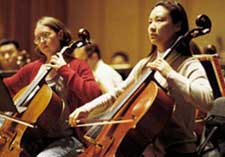
Got a headache or labour pains? Forget painkillers and Caesareans,
good music may be all you need, says Dr Ramakant Keni
Despite all the
advances in medical science, computerised diagnostics and ultra-modern
healthcare, researchers and scientists are turning to a traditional, basic and
innate power that heals as it soothes: Music.
All over the developed
world, hundreds of thousands of dollars are being poured into studies that seek
to find how and why music has the subtle power to heal chronic aliments that
refuse to bend to the dictates of chemotherapy, radiation and laser excision.
Research currently underway in countries like the United States,
Germany, Italy and Scandinavian countries attempts to find a scientific
correlation between the healing of diseased bodies while soothing a troubled
mind and a tormented soul. The most significant find was that music is the key
to unlocking the thalamus and thereby making healing easier to
accomplish.
Easing Notes
In
the last 27 years of practising alternative healing, I have found music therapy
more effective than any drugs. In some cases, where I have prescribed the use of
soothing music, particularly Indian classical ragas, the results have invariably
been positive.
When Pinky Pawani, 32, went into labour at the Meera
Agarwal Nursing Home, Baroda, she insisted on a normal delivery. Pinky was ready
to bear the pain but when, after over nine hours, she hadn’t delivered,
the doctors suggested a Ceasarian. I suggested playing raga Bageshwari on an
instrument such as a ‘sarod’ or flute. As soon as the music started
playing, Pinky felt better, and in 40 minutes gave birth to a healthy baby, the
natural way.
Raga Bageshwari is one of the rare ragas that controls
the mind overwhelmed by despair and defeat. It is the most stimulating raga for
the mind.
Of Sound, Mind and
Body

Not only does music have an emotional effect but also works like a
balm for stress, depression, anxiety and pain. Music therapy can also be used to
treat insomnia, epilepsy, strokes, overcome learning disabilities, Alzheimer's
disease and other ageing related conditions, substance abuse problems, brain
injuries, physical disabilities, and acute and chronic pain.
Evidence shows that listening to appropriate music lowers BP,
stabilises heart rate, relieves depression, reduces pre-treatment anxiety,
enhances concentration and creativity, lessens the need for sedatives and
painkillers (during and after surgery), reduces fear and nausea during and after
chemotherapy, manages pain and also improves stability of people with
Parkinson’s disease.
It is a scientific fact that sound affects
everything, as it is all-pervasive in our world. Harsh, loud and cacophonic
sounds can disturb the mind and therefore the body; perfectly metered sounds
have highly beneficial effects on all. The mantras or chants of the Vedas are in
fact scientific sound formulas set in such a manner, that when chanted in
accordance with the prescribed meter of sound, they have tremendously powerful
effects on the surrounding atmosphere. These effects are subtle and essential in
nature.
The ancient Indian sages developed the ragas, so when they
are sung or played they cause great bliss and quietude in the listener, thus
both mind and the body get immense peace and
benefit.
Music For Premature Babies
Music is used to treat premature children. Dr Schwartz, an
intensive care doctor at Piedmont Hospital, Atlanta, Georgia, has specialised in
antenatal and post-natal care. Inside the womb, the noise level is around 80 to
95 decibels — a sound almost as loud as in a disco on a Saturday night.
This is caused by the blood flow in the placenta as well as the
mother’s breathing and heartbeats. At birth, the sudden loss of this noise
is stressful for the child, which is why Dr Schwartz developed a kind of womb
music. He explained that the neonates, who had been exposed to the transition
music, spent an average of three days less in intensive care than otherwise.
What Scientists Say



